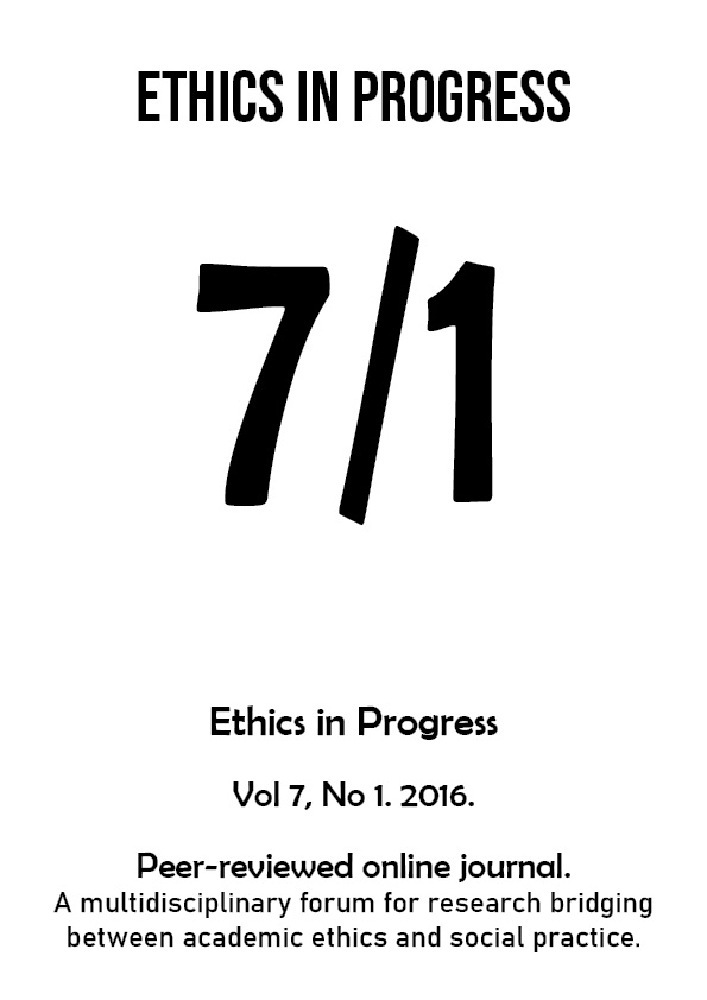Abstract
The problem of natural resources being finite as well as the capability of ecosystems and the biosphere to assimilate the effects of economic activity on the one hand, and growing economic discrepancies on the other raise a question mark over the chase after the unrestrained economic growth. In the search for alternative models of thinking and development a significant role of constraint is being more and more emphasized. In the case of ecological barriers limitation of using non-renewable resources, greenhouse gases emissions, excessive consumption and production seems to be a reasonable strategy that manifests our care for the natural environment.
The aim of the paper is to demonstrate that the postulate of constraint present in the de-growth model in the form proposed by Tim Jackson and Serge Latouche apart from a quantitative dimension has, above all, a qualitative and ethically orientated dimension. Constraint conceived in the above way stays close to terms like moderation, restraint, sustainability, i.e. such terms that possess solid ethical foundations and constitute an important base for environmental ethics.
References
Ariés, P. 2005. Décroissance ou barbarie. Villeurbanne: éditions Golias.
Bauman, Z. 2015. “O przemijaniu trwania”. In K. Kuligowska & C. Obracht–Prondzyński (eds.) Śmieć w kulturze. Gdańsk: Wydawnictwo Naukowe Katedra.
Ciążela, H. 2015. “Wokół biologii, ekonomii, moralności. Miejsce Thomasa Roberta Malthusa w historii etyki”. In P. Domeracki, A. Grzeliński, & R. Wiśniewski (eds.) Filozofia–Etyka–Ekologia. Profesorowi Włodzimierzowi Tyburskiemu w darze (pp. 491–499). Toruń: Wydawnictwo Naukowe Uniwersytetu Mikołaja Kopernika.
EEA Signals. 2009. “Key environmental issues facing Europe”. URL: http://www.eea.europa.eu/publications/signals-2009 (retrieved on 22.12.2015)
Elgin, D. & A. Michell. 1977. “Voluntary Simplicity.” The Co-Evolution Quarterly, Vol. Summer: 1–40.
Gorz, A. 1994. Capitalism, Socialism, Ecology. London: Verso.
Hall, C. A. S. & J. W. Day. 2009. “Revisiting the Limits to Growth After Peak Oil.” American Scientist, Vol. 97: 230-237.
Harrdin, G. 1968. “The Tragedy of Commons.” Science, Vol. 162: 1243–1248.
Helm, D. 2009. Environmental Challenges in a Warming World: Consumption, Costs and Responsibilites. Oxford: New College.
Hull, Z. 2003. “Wartości ekologiczne dla zrównoważonego rozwoju”. In A Pawłowski (ed) Filozoficzne i społeczne uwarunkowania zrównoważonego rozwoju. Warszawa: Monografie Komitetu Inżynierii Środowiska.
Hull, Z. 2008. “The Philosophical and Social Conditioning of Sustainable Development.” Problemy Ekorozwoju Vol. 3: 27–31.
Jackson, T. 2005. “Live Better by Consuming Less? Is There a «Double Dividend» in Sustainable Consumption?” Journal of Industrial Ecology, Vol. 9: 19–36.
Jackson, T. 2009. Prosperity Without Growth: Economics for a Finite Planet. London: Earthscan Press.
Jackson, T. 2011. “Żelazna klatka konsumpcjonizmu”. Instytut Obywatelski 30.09.2011. URL: http://www.instytutobywatelski.pl/2687/lupa-instytutu/zelazna-klatka-konsumpcjonizmu (retrieved on 22.01.2016)
Krajewski, P. 2013. “Justice and Accountability as a Basis for Sustainable Development – the Case of International Environmental Law.” Problemy Ekorozwoju, Vol. 7: 15–31.
Krall, H. 2015. “Było dużo niepokoju.” In M. Nogaś (ed) Z najwyższej półki. URL: http://www.polskieradio.pl/9/874/Artykul/1489430,Hanna-Krall-bylo-duzo-niepokoju (retrieved on 22.12.2105).
Kronenberg, J. & N. Iida. 2011. “Simple Living and Sustainable Consumption.” Problems of Sustainable Development, Vol. 2: 67–74.
Latouche, S. 2003. “Absurdité du productivisme et des gaspillages. Pour une société de décroissance”. Le Monde Diplomatique, Vol. Novembre.
Latouche, S. 2004. “Contre l’ethnocentrisme du développement. Et la décroissance sauvera le Sud...”. Le Monde Diplomatique, Vol. Novembre.
Latouche, S. 2005. “Vers la décroissance. Écofascisme ou écodémocratie”. Le Monde Diplomatique, Vol. Novembre.
Latouche, S. 2007. “Petit traité de la décroissance sereine”. Paris: Mille et Une Nuits.
Latouche, S. 2009. Farewell to Growth. Cambridge: Polity Press.
Malthus, T.R. 2003. Prawo ludności. Warszawa: Wydawnictwo De Agostini.
Meadows, D., J. Rander, & W. W. Behrens III. 1972. The Limits to Growth. A report to the Clube of Rome. New York: Univers Books.
Meadows, D., J. Randers, & D. Meadows. 2004. Limits to Growth: the 30-Year Update. London: Earthscan.
Norton, B. G. 2005. Sustainability. A Philosophy of Adaptive Ecosystem Managment. Chicago: Chicago University Press.
Olson, M. & H. H. Landsberg. 1973. The No-Growth Society. New York: Norton & Company.
Papuziński, A. 2013. “The Axiology of Sustainable Development: An Attempt at Typologization.” Problems of Sustainable Development, Vol. 8: 5–25.
Papuziński, A. 2014. “Sustainable Development in the Context of the Theory of Intergenerational Justice. An Attempt to Specify a Problem.” Studies in Global Ethics and Global Education, Vol. 2: 12–27.
Popkiewicz, M. 2012. Świat na rozdrożu. Katowice: Wydawnictwo Sonia Draga.
SDC. 2003. Redefining Prosperity. London: Sustainable Development Commision. URL: http://www.sd-commission.org.uk/data/files/publications/030627%20Redefining%20prosperity,%20resource%20productivity.pdf (retrieved on 22.12.2015).
SDC. 2011. Know your environmental limits. A local leaders’ guide. London: Sustainable Development Commision. URL: http://www.sd-commission.org.uk/data/files/publications/know_your_env_limits1.pdf (retrieved on 22.12.2015).
Stern, N. 2007. The Economics of Climate Change: The Stern Review. Cambridge: Cambridge University Press.
Stern, N. 2010. Globalny ład. Warszawa: Wydawnictwo Krytyki Politycznej.
Szahaj, A. 2016. “Napędzanie konsumpcji, czyli jak wielki biznes ogranicza naszą wolność”. Dziennik Gazeta Prawna z dn. 16.01.2016. URL: http://forsal.pl/artykuly/916688,napedzanie-konsumpcji-czyli-jak-wielki-biznes-ogranicza-nasza-wolnosc.html (retrieved on 22.01. 2016).
Turner, G. 2008. A Comparison of the Limits to Growth with Thirty Years of Reality. CSIRO. Vol. June. URL: hhht://ecsim.org/Vista/archivos/TURNER%20G%20-%20TLG%2030%20years%20comparison%20to%20reality.pdf (retrieved on 22.12.2015).
Tyburski, W. 2011. Etyka środowiskowa i jej wkład w budowanie świadomości sprzyjającej wdrażaniu idei zrównoważonego rozwoju In Tyburski, W. (ed) Zasady kształtowania postaw sprzyjających wdrażaniu zrównoważonego rozwoju (pp. 85–157). Toruń: Wydawnictwo Naukowe Uniwersytetu Mikołaja Kopernika.
UNEP. 2011. “Decoupling Natural Resource Use and Environmental Impacts from Economic Growth.” United Nations Environment Programme. URL: http://www.unep.org/resourcepanel/decoupling/files/pdf/
Decoupling_Report_English.pdf (retrieved on 22.15.2015).
Weber, M. 1987. Polityka jako zawód i powołanie. Warszawa: Niezależna Oficyna Wydawnicza.
Weitzman, M. L. 2007. A Review of “The Stern Review of the Economics of Climate Change.” Journal of Economic Literature, Vol. XLV: 703–724.
Wiśniewski, R. 2015. “Aksjologia ekologii”. In P. Domeracki, A. Grzeliński, & R. Wiśniewski (eds.) Filozofia–Etyka–Ekologia. Profesorowi Włodzimierzowi Tyburskiemu w darze (pp. 793–806). Toruń: Wydawnictwo Naukowe Uniwersytetu Mikołaja Kopernika.
WWF. 2006. Living Planet Report 2006. URL: http://d2ouvy59p0dg6k.cloudfront.net/downloads/living_planet_report.pdf (retrieved on: 22.12.2015)




